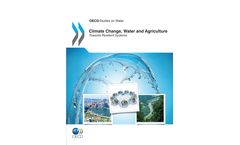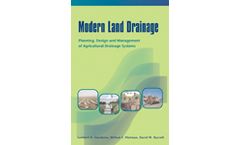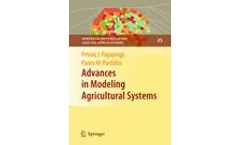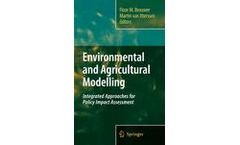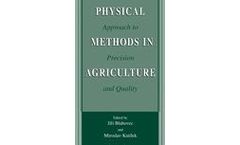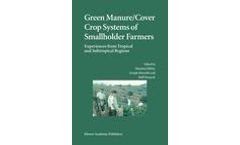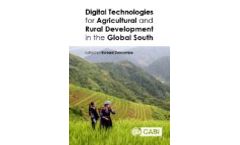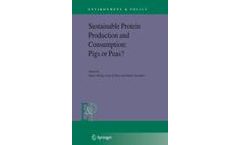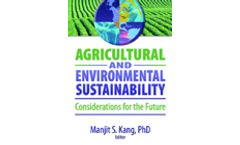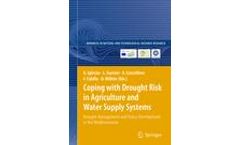system-for-agriculture books
28 books found
The survival and success of all living organisms are determined by energy and matter transfers between the upper layers of the soil profile and the lowest levels of its atmosphere. In this monograph 50 experts collaborated to develop 23 chapters detailing the role that micrometeorology plays in crop production systems and terrestrial ...
Current issues in world agricultural development, and those of tomorrow, are interdisciplinary, multidisciplinary, transnational, and global. Contributions derived from a Societies-World Bank symposium address on-farm, institutional, and policy levels of action in the effort to develop global agriculture sustainably. Experts from every continent provide examples of vision and success, including a ...
This report analyses the adaptive capacity in agricultural water management, adaptation in agriculture to water variability and extreme events, (floods and droughts), mitigation, (water and energy) and uncertainty about further climate change. ...
Modern Land Drainage is a fully renewed and extended edition of Land Drainage: Planning and Design of Agricultural Drainage systems, which was first published in 1983 (Batsford, London). The book is based on traditional drainage methods for rain-fed agriculture in the humid temperature zone. Significant parts are devoted to drainage for salinity ...
Although the application of systems approaches in agricultural research and natural resource management is a rather new field, there is already increasing demand for implementation of these approaches. This will require a critical mass of specialists in national agricultural research systems and international ...
Flexible Incentives for the Adoption of Environmental Technologies in Agriculture identifies and structures more flexible economic incentives for the achievement of environmental goals in agriculture. It provides a conceptual framework and presents case studies that analyze how flexible incentives can address environmental problems that are caused by agricultural production. The book brings ...
This book presents an up-to-date review of advances in the mathematical modeling of agricultural systems. It covers a broad spectrum of problems and applications based on internet and communications technology, as well as methodological approaches based on the integration of different simulation and data management tools. ...
Agriculture increasingly faces the challenge of balancing its multiple functions in a sustainable way. Integrated assessment and modelling (IAM) can provide insight into the potential impacts of policy changes. However, concepts to address the wide range of issues and functions typical for agriculture are still scarce. Environmental and Agricultural Modelling reviews and presents our current ...
The papers in this book deal with both the physical theories and their applications in the full broad range of agriculture: soils, their parameters and transport processes, soil technology, precision agriculture, agricultural products and their processing, testing and storage and products, genetic modification of agricultural plants. In all those subjects the physical aspects are studied. The ...
This volume examines the various drivers of global change, including climate change, and the use of agricultural knowledge, science, and technology, as well as the outcomes of global change processes, including impacts on water quality and human well-being. Several authors examine potential policy and institutional solutions afforded by globalization to the challenges ahead, particularly the role ...
Boron in Soils and Plants: Reviews is the most up-to-date and comprehensive review of our knowledge of boron in soils, plants and animals. This volume coincides with a period of significant progress in boron research. It covers recent advances in the identification of the physical and chemical role of B in the cell wall, the characterisation of the genetic basis for differences in B ...
They are a key component of sustainable agricultural systems because of symbiotic nitrogen fixation and other beneficial symbiosis with mycorrhizal fungi. ...
In the 1980s and 1990s, green manure/cover crop (GMCC) systems became a popular agricultural technology in research and development efforts for smallholder tropical and subtropical farmers. ...
Chemical fertilizers have had a significant impact on food production in the recent past, and are today an indispensable part of modern agriculture. On the other hand, the oil crisis of the 1970s and the current Middle East problems are constant reminders of the vulnerability of our fossil fuel dependent agriculture. There are vast areas of the developing world where N fertilizers are ...
They are cost effective, ecofriendly and a renewable source of plant nutrients to supplement chemical fertilizers in sustainable agricultural systems in India. This book is written with the objective of covering the basic issues in Biological Nitrogen Fixation (BNF), such as physiology, biochemistry and molecular genetics of nitrogen ...
Economic growth after World War II was made possible through dramatic increases in the use of material resources and energy. It is apparent that current development patterns followed by industrialized countries are causing serious environmental problems and that they are neither ecologically nor socially sustainable. In recent years, many Asian developing countries, which have suffered ...
This book shares research and practice on current trends in digital technology for agricultural and rural development in the Global South. Growth of research in this field has been slower than the pace of change for practitioners, particularly in bringing socio-technical views of information technology and agricultural development perspectives together. The contents are therefore structured ...
Sustainable Protein Production and Consumption: Pigs or Peas? is a book that presents and explores the PROFETAS programme for development of a more sustainable food system by studying the feasibility of substituting meat with plant based alternatives. The emphasis is on improving the food system by reducing the use of energy, land, and freshwater, at the same time limiting the impacts on health ...
Understand sustainable development from economic, ecological, and social perspectives As world population continues to increase, the need grows for a safe, sustainable supply of food. Agricultural and Environmental Sustainability: Considerations for the Future provides the latest research results and vital information on the process of producing an enduring food supply that is healthy for ...
Over the last three decades drought episodes have resulted in severe social problems in Mediterranean countries, receiving broad attention from the international scientific and policy communities. The experiences in the development and implementation of drought management plans highlight the success and challenges of coping with drought for societies with different vulnerabilities and emphasize ...


